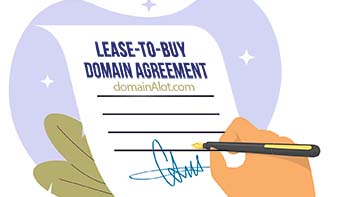Domain Investment Pitfalls: Cybersquatting
A domain investor must always consider the dangers acquiring a domain that potentially takes advantage of a company or individual

Cybersquatting is when someone registers, uses, or sells a domain name with the intent of profiting from someone else's trademark or brand name. The idea is usually to take advantage of the reputation or recognition of a company or individual by owning a domain that looks like it's associated with them, even though it's not. Not only is it considered illegal under laws like the Anticybersquatting Consumer Protection Act (ACPA), but for domain investors, the rule is simple: avoid registering names that belong to existing brands or closely resemble them.
Infringement Is No Joke
Buying and selling domains can seem simple at first, but the legal landscape around domain names is anything but. Whether you're trying to flip a catchy .com or building a long-term portfolio, ignoring the legal side can result in serious problems. One of the most important parts of domain investing is making sure you're not infringing on someone else's intellectual property. This goes beyond being careful with obvious brand names. There are cases where investors bought what they thought were generic or clever domains, only to be hit with legal notices or domain disputes because they unknowingly touched on a registered trademark.
So, if you're investing in domains, understanding how trademarks work is critical.
Knowledge Is Power
Just because a domain is available doesn't mean it's legally safe to use or resell. Many businesses register trademarks for brand protection, and if your domain even resembles one too closely in name or context, it can be flagged for infringement. This is especially true if your domain is related to the same goods or services as the registered brand. It doesn't even have to be identical. If your domain is considered confusingly similar, it may fall under scrutiny.
To avoid running into problems, research should always be your first step before buying a domain.
Free tools like the USPTO trademark search (TESS) in the United States, or the WIPO Global Brand Database, allow you to check whether a term is already protected.
The key to performing any search is to look not just at identical matches, but also at variations and related terms. It may seem cumbersome, but a bit of research upfront can save you from losing the domain or facing legal costs later.
Reputation Is Everything To An Investor
Cybersquatting is one of the fastest ways to lose a domain and your own credibility.
Most cybersquatters deliberately register domains that are identical or confusingly similar to well-known brand names. Sometimes they'll try to sell the domain back to the company at a higher price, hoping that the brand owner doesn't want to risk a legal fight. In other cases, they might use the domain to attract traffic and earn ad revenue, mislead customers, or even harm the brand by associating it with questionable content.
Either way, the practice of registering a domain specifically to profit from another company's name or brand, is something you absolutely do not want to be party to, or associated with. Even if your intentions are harmless, if the domain looks like an attempt to mislead, leverage a brand's reputation, or an attempt is made to sell the domain back to that company at a high price, it may well be seen as an act of bad faith under UDRP rules.
Uniform Domain-Name Dispute-Resolution Policy is what organisations often use to recover domains without needing to go through the court system. UDRP complaints can result in you losing the domain entirely with no refund or appeal. Worse than this, it shows that your intention was to mislead, and why would anyone want to buy a domain from you in the future?
Never Assume
One common mistake newer domain investors make is assuming generic words are always safe.
While a word like "apple" might seem generic, there's no one in the world who isn't aware that the term is heavily trademarked in the context of electronics. If you registered appletechhub.com, for example, you might find yourself on the receiving end of a dispute notice. Why? Because those trademarks aren't cheap. In fact, in larger conglomerates, actual departments consisting of teams of lawyers and paralegals are employed solely to be on the lookout and hunt for domain owners who willing, or inadvertently, register a domain that infringes either directly or indirectly upon existing intellectual property. You see, those properties most likely took years, and substantial amounts of monies to establish, and must rightly be protected.
Context
The safest domains are truly generic and not used in any trademarked business category. However, it's unreasonable, and foolhardy to expect that only domains with generic words can be reigstered, even when sometimes, as in the case of apple, a generic word is no longer generic in a specific situation, which is why context matters a lot. The same word in a different industry could be totally fine.
Imagine, a fruit juicer called Apple Crush using the domain apple-crush.com. Even though the clever lawyers at Apple might try to infer that the domain could be interpreted as a homage to Apple's digital products, in the context of it's use, that's a hard sell and could hardly constitute infringement.
Over the years, several domain disputes have made headlines, either because the domain owner clearly overstepped or, in some cases, because they stood their ground and won.
Looking at both sides can help domain investors better understand where the legal line actually is and how to avoid crossing it.
MikeRoweSoft.com
One of the more well-known examples of a domain owner losing is the case involving MikeRoweSoft.com.
A Canadian high school student named Mike Rowe registered the domain as a playful pun on Microsoft. He used the site for his web design services, thinking it was harmless humor. Microsoft, however, didn't find it funny. They filed a complaint, claiming it was confusingly similar to their brand and constituted cybersquatting. The case gained media attention due to the underdog story, but in the end, Mike was forced to transfer the domain. While it wasn't a malicious attempt to impersonate the tech giant, and neither did he attempt to sell the domain to Microsoft or anyone else for profit, the fact that the name sounded identical phonetically was enough to justify a claim under the Uniform Domain-Name Dispute-Resolution Policy (UDRP).
This case is a reminder that intention doesn't always protect you if the name treads too closely to a trademark.
GoogleSucks.com
Another classic loss for a domain investor was the GoogleSucks.com case.
While parody domains often enjoy some protection, especially under free speech laws in the US, the issue here wasn't necessarily the opinion expressed. It was the commercial use of Google's name in the domain.
Google argued that the domain could confuse users or damage their brand, even if the site was critical of them. While the case didn't go to a final ruling, the domain was eventually transferred after pressure from Google's legal team, demonstrating how even "negative" domains can run into trouble when they include well-known trademarks.
Octogen Pharmacal Company, Inc. v. Domains By Proxy, Inc.
Conversely, there have been successful defenses by domain owners.
In the Octogen Pharmacal Company, Inc. v. Domains By Proxy, Inc. case, the complainant filed a UDRP dispute against a domain that included "octogen," claiming trademark rights. However, the domain owner proved that "octogen" was also a chemical compound term that had legitimate generic usage in other fields. As a result, the panel ruled in favour of the domain owner, highlighting how generic or descriptive words, even if trademarked in one industry, may not always be protected across the board.
Nissan.com
Another interesting win involved the domain Nissan.com, owned by Uzi Nissan, an entrepreneur who had been using the domain for his computer business since the early 90s. The car manufacturer Nissan filed a lawsuit years later, trying to take the domain from him. Uzi Nissan had trademark rights to his own name and used the domain legitimately, well before the auto company had an online presence. The case dragged on for years in court, but Uzi kept the domain.
To this day, it remains one of the most well-known cases in domain law and serves as a rare example of an individual successfully defending a valuable domain against a major corporation.
Timing, Intent, And Nature
What separates the winning cases from the losing ones often comes down to timing, intent, and the generic nature of the term.
If you register a domain that clearly mirrors an existing brand name, especially one with an established trademark, and you have no legitimate use for it, then you must accept the fact that you're at risk of losing it under a UDRP complaint.
However, if you register a domain based upon a common word, your last name, or a term used across multiple industries and can show that you're using it in good faith, your chances of keeping it are much better. This is why, for serious domain investors, having a vetting process is non-negotiable, because it's not just about avoiding trouble, it's also about ensuring your domains are legitimate assets.
In other words, a domain free of legal baggage is easier to sell, easier to market, and far more attractive to buyers. In some cases, a buyer might do their own legal check before purchasing. If you've already done that work, it builds trust and helps the deal move faster.
Legal Clarity Adds Value
The legal side of domain investing isn't meant to scare you away. It's meant to help you build smarter and safer.
With a little due diligence and a solid understanding of trademarks, you can quickly, and confidently grow a portfolio that holds real long-term value.
The takeaway for domain investors is to do your research before buying, and even more so before attempting to monetise or resell. Understand the risk levels. Domains that include brand names, even when used in satire or commentary, are usually more trouble than they're worth. On the other hand, investing in clean, brand-safe domains that don't step on intellectual property gives you an asset you can market confidently, and make no mistake, legal clarity really does add value.
As the domain space continues to evolve, so will the ways companies protect their names and reputations online.
Smart investors stay ahead by not only watching the market but also understanding the rules of the game.
If you're holding domains you're unsure about or looking to sell a portfolio that you've vetted and built cleanly, consider listing here at: domainAlot.com, where quality domains and transparency come first.





